|
Books Should Be Free Loyal Books Free Public Domain Audiobooks & eBook Downloads |
|
|
Books Should Be Free Loyal Books Free Public Domain Audiobooks & eBook Downloads |
|
Religion |
|---|
|
Book type:
Sort by:
View by:
|
By: Saint Thomas Aquinas (1225-1274) | |
|---|---|
 Summa Theologica - 12 Pars Secunda Secundae, Treatise on Gratuitous Graces and the States of Life
Summa Theologica - 12 Pars Secunda Secundae, Treatise on Gratuitous Graces and the States of Life
The Summa Theologica (or the Summa Theologiae or simply the Summa, written 1265–1274) is the most famous work of Thomas Aquinas (c. 1225–1274) although it was never finished. It was intended as a manual for beginners and a compilation of all of the main theological teachings of that time. It summarizes the reasoning for almost all points of Christian theology in the West, which, before the Protestant Reformation, subsisted solely in the Roman Catholic Church. The Summa's topics follow a cycle: the existence of God, God's creation, Man, Man's purpose, Christ, the Sacraments, and back to God... | |
 Summa Theologica - 04 Pars Prima, On Man
Summa Theologica - 04 Pars Prima, On Man
The Summa Theologica (or the Summa Theologiae or simply the Summa, written 1265–1274) is the most famous work of Thomas Aquinas (c. 1225–1274) although it was never finished. It was intended as a manual for beginners and a compilation of all of the main theological teachings of that time. It summarizes the reasoning for almost all points of Christian theology in the West, which, before the Protestant Reformation, subsisted solely in the Roman Catholic Church. The Summa's topics follow a cycle: the existence of God, God's creation, Man, Man's purpose, Christ, the Sacraments, and back to God. | |
 Catena Aurea, St. Matthew - Vol 1, Part 1
Catena Aurea, St. Matthew - Vol 1, Part 1
The Catena Aurea presents the commentaries of the greatest theologians of the Church as if they were having a discussion on each verse of the Bible. St. Thomas Aquinas put this opus together from sermons and commentaries on the Gospels composed by over eighty early Church Fathers, providing their insights into each passage. The work shows his intimate acquaintance with the Early Fathers. The work was commissioned by Pope Urban IV, so that everyone could hold to the fundamental rule of the Church, that no one is to interpret Sacred Scripture contrary to the unanimous consent of the Fathers . This first volume covers Matthew 1 - 10. | |
 Catena Aurea, St. Matthew - Vol 1, Part 2
Catena Aurea, St. Matthew - Vol 1, Part 2
A catena is a form of biblical commentary, verse by verse, made up entirely of excerpts from earlier Biblical commentators, each introduced with the name of the author, and with such minor adjustments of words to allow the whole to form a continuous commentary. The texts are mainly compiled from mainstream authors, but they often contain fragments of certain patristic writings now otherwise lost. It has been asserted by Faulhaber that half of all the commentaries on scripture composed by the Church Fathers are now extant only in this form. - Summary by Wikipedia | |
 Catena Aurea, St. Matthew - Vol 1, Part 3
Catena Aurea, St. Matthew - Vol 1, Part 3
The Catena Aurea presents the commentaries of the greatest theologians of the Church as if they were having a discussion on each verse of the Bible. St. Thomas Aquinas put this opus together from sermons and commentaries on the Gospels composed by over eighty early Church Fathers, providing their insights into each passage. The work shows his intimate acquaintance with the Early Fathers. The work was commissioned by Pope Urban IV, so that everyone could hold to the fundamental rule of the Church, that no one is to interpret Sacred Scripture contrary to the unanimous consent of the Fathers . | |
 Catena Aurea, St. John - Vol 4, Part 1
Catena Aurea, St. John - Vol 4, Part 1
The Catena Aurea presents the commentaries of the greatest theologians of the Church as if they were having a discussion on each verse of the Bible. St. Thomas Aquinas put this opus together from sermons and commentaries on the Gospels composed by over eighty early Church Fathers, providing their insights into each passage. The work shows his intimate acquaintance with the Early Fathers. The work was commissioned by Pope Urban IV, so that everyone could understand the established meaning of the Gospels from the teaching of the early Fathers. | |
 Catena Aurea, St. John, - Vol 4 part 2
Catena Aurea, St. John, - Vol 4 part 2
The Catena Aurea presents the commentaries of the greatest theologians of the Church as if they were having a discussion on each verse of the Bible. St. Thomas Aquinas put this opus together from sermons and commentaries on the Gospels composed by over eighty early Church Fathers, providing their insights into each passage. The work shows his intimate acquaintance with the Early Fathers. The work was commissioned by Pope Urban IV, so that everyone could understand the established meaning of the Gospels from the teaching of the early Fathers. - Summary by ancientchristian | |
 Catena Aurea (Gospel of St. Luke - Part 1)
Catena Aurea (Gospel of St. Luke - Part 1)
The Catena Aurea presents the commentaries of the greatest theologians of the Church as if they were having a discussion on each verse of the Bible. St. Thomas Aquinas put this work together from sermons and commentaries on the Gospels composed by over eighty early Church Fathers, providing their insights into each passage. The work shows his intimate acquaintance with the Early Fathers. The work was commissioned by Pope Urban IV, so that everyone could understand the established meaning of the Gospels from the teaching of the early Fathers. - Summary by ancientchristian | |
 Catena Aurea (Gospel of St. Luke - Part 2)
Catena Aurea (Gospel of St. Luke - Part 2)
The Catena Aurea presents the commentaries of the greatest theologians of the Church as if they were having a discussion on each verse of the Bible. St. Thomas Aquinas put this work together from sermons and commentaries on the Gospels composed by over eighty early Church Fathers, providing their insights into each passage. The work shows his intimate acquaintance with the Early Fathers. The work was commissioned by Pope Urban IV, so that everyone could understand the established meaning of the Gospels from the teaching of the early Fathers. - Summary by ancientchristian | |
 Catena Aurea: Gospel of St. Mark
Catena Aurea: Gospel of St. Mark
The Catena Aurea presents the commentaries of the greatest theologians of the Church as if they were having a discussion on each verse of the Bible. St. Thomas Aquinas put this opus together from sermons and commentaries on the Gospels composed by over eighty early Church Fathers, providing their insights into each passage. The work shows his intimate acquaintance with the Early Fathers. The work was commissioned by Pope Urban IV, so that everyone could understand the established meaning of the Gospels from the teaching of the early Fathers. - Summary by ancientchristian | |
 Summa Contra Gentiles, First Book (On God)
Summa Contra Gentiles, First Book (On God)
The Summa Contra Gentiles was composed by Thomas Aquinas between 1259 and 1265, in four books broadly covering teachings on God, on Creation, on Providence, and on tenets specific to Christianity. This Summa is not to be confused with his final Summa, the Summa Theologiae. The latter is specifically "theological" and directed to a Christian audience , whereas the former, as the "Contra Gentiles" indicates, is directed toward "non-Christian" thinkers. Implicitly a defence of the Catholic Christian... | |
By: Samuel Butler (1835-1902) | |
|---|---|
 God the Known and God the Unknown
God the Known and God the Unknown
| |
 The Fair Haven
The Fair Haven
| |
By: Samuel Cheetham | |
|---|---|
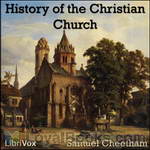 History of the Christian church
History of the Christian church
The intention of this work is to provide a sketch of the History of the Church in the first six centuries of its existence, resting throughout on original authorities, and also giving references to the principal modern works which have dealt specially with its several portions. It is hoped that it may be found to supply a convenient summary for those who can give but little time to the study, and also to serve as a guide for those who desire to make themselves acquainted with the principal documents from which the History is drawn. | |
By: Samuel D. Gordon (1859-1936) | |
|---|---|
 Quiet Talks on Prayer
Quiet Talks on Prayer
An open life, an open hand, open upward, is the pipe line of communication between the heart of God and this poor befooled old world. Our prayer is God’s opportunity to get into the world that would shut Him out. (From the first chapter) | |
 Quiet Talks about Jesus
Quiet Talks about Jesus
So far as I can find out, I have no theory about Jesus to make these talks fit into. I have tried to find out for myself what the old Book of God tells about Him. And here I am trying to tell to others, as simply as I can, what I found. It was by the tedious, twisting path of doubt that I climbed the hill of truth up to some of its summits of certainty. I am free to confess that I am ignorant of the subject treated here save for the statements of that Book, and for the assent within my own spirit to these statements, which has greatly deepened the impression they made, and make... | |
 Quiet Talks on the Crowned Christ of Revelation
Quiet Talks on the Crowned Christ of Revelation
| |
 Quiet Talks on John's Gospel
Quiet Talks on John's Gospel
| |
 Quiet Talks on Service
Quiet Talks on Service
| |
 Quiet Talks on Following the Christ
Quiet Talks on Following the Christ
| |
 Quiet Talks with World Winners
Quiet Talks with World Winners
| |
By: Samuel Davidson (1806-1898) | |
|---|---|
 The Canon of the Bible
The Canon of the Bible
| |
By: Samuel Gordon (1871-1927) | |
|---|---|
 Sons of the Covenant: A Tale of London Jewry
Sons of the Covenant: A Tale of London Jewry
Born in London's poverty-stricken and heavily Jewish East End, the Lipcott boys create their own successes in life and love. The brothers' commitment to improving the lives of working class people leads them to concoct The Scheme to help both the residents of their former neighbourhood and the Jewish people as a whole. The author stresses the responsibility of middle class Jews toward the Jewish poor. Consequently, this 1900 story has its preachy moments as well as some essentialised speculations about Jewish history and character... | |
By: Samuel Graham Wilson (1858-1916) | |
|---|---|
 Bahaism and Its Claims A Study of the Religion Promulgated by Baha Ullah and Abdul Baha
Bahaism and Its Claims A Study of the Religion Promulgated by Baha Ullah and Abdul Baha
| |
By: Samuel H. Goodwin (1862-1951) | |
|---|---|
 Mormonism and Masonry
Mormonism and Masonry
The edition of the book published in 1921 explored extensively the reasons why Mormons were not accepted ("are" at the time of publication) into the Masonic Lodges. | |
By: Samuel Johnson (1709-1784) | |
|---|---|
 Prayers and Meditations
Prayers and Meditations
The prayers and meditations of Samuel Johnson, published posthumously by George Strahan to whom Johnson had entrusted the manuscripts. Johnson had been writing these down for over forty years. They often show him at his most repentant, melancholy and fragile -- and the book was controversial because of it -- but they also show the goodness, sense and strength which has always characterised this great man. - Summary by Steven Watson | |
By: Samuel Logan Brengle (1860-1936) | |
|---|---|
 Heart Talks on Holiness
Heart Talks on Holiness
Samuel Logan Brengle was a commissioner in the Salvation Army. His books are known for the practicality, joyfulness and authenticity. His life was spent working with people on the streets, so his insights into the work of the Holy Spirit are relevant to everyday life. His holiness was that of the street, the kitchen, and everyday life. His stories are of men and women living their daily lives. This is the second book in his "Holiness" series, which focuses on the gifts of the Holy Spirit. In particular, we are encouraged to follow the example of Paul in rejoicing through suffering, and learning to serve God in all circumstances. | |
 Way of Holiness
Way of Holiness
Samuel Logan Brengle was a commissioner in the Salvation Army. His books are known for the practicality, joyfulness and authenticity. His life was spent working with people on the streets, so his insights into the work of the Holy Spirit are relevant to everyday life. His holiness was that of the street, the kitchen, and everyday life. His stories are of men and women living their daily lives. This is the third book in his "Holiness" series, which focuses on becoming like Jesus. - Summary by Beth Thomas | |
 Soul Winner's Secret
Soul Winner's Secret
Samuel Logan Brengle was a commissioner in the Salvation Army. His books are known for the practicality, joyfulness and authenticity. His life was spent working with people on the streets, so his insights into the work of the Holy Spirit are relevant to everyday life. His holiness was that of the street, the kitchen, and everyday life. His stories are of men and women living their daily lives. In this book, Brengle explores how to live the Christian life so that we are full of contagious joy; how... | |
 Helps to Holiness
Helps to Holiness
Samuel Logan Brengle was a commissioner in the Salvation Army. His books are known for the practicality, joyfulness and authenticity. His life was spent working with people on the streets, so his insights into the work of the Holy Spirit are relevant to everyday life. His holiness was that of the street, the kitchen, and everyday life. His stories are of men and women living their daily lives. This book is the first in his "Holiness" trilogy, explaining what Holiness is and how to get it. - Summary by Beth Thomas | |
 Love Slaves
Love Slaves
Samuel Logan Brengle was a commissioner in the Salvation Army. His books are known for the practicality, joyfulness and authenticity. His life was spent working with people on the streets, so his insights into the work of the Holy Spirit are relevant to everyday life. His holiness was that of the street, the kitchen, and everyday life. His stories are of men and women living their daily lives. In this book, Brengle explores how to live the Christian life so that we are walking in the centre of God's Will and daily showing His Love to the world around us. From the Preface by General Bramwell Booth: Here are words to clear the thought, as well as to guide the Will and strengthen the Heart. | |
By: Samuel Smiles (1812-1904) | |
|---|---|
 The Huguenots in France
The Huguenots in France
| |
By: Samuel Taylor Coleridge (1772-1834) | |
|---|---|
 Confessions of an Inquiring Spirit and Some Miscellaneous Pieces
Confessions of an Inquiring Spirit and Some Miscellaneous Pieces
| |
By: Samuel Ward (1577-1640) | |
|---|---|
 A Coal From The Altar, To Kindle The Holy Fire of Zeale In a Sermon Preached at a Generall Visitation at Ipswich
A Coal From The Altar, To Kindle The Holy Fire of Zeale In a Sermon Preached at a Generall Visitation at Ipswich
| |
By: Samuel Wilberforce (1805-1873) | |
|---|---|
 The Rocky Island and Other Similitudes
The Rocky Island and Other Similitudes
| |
By: Sanger Brown (1884-1968) | |
|---|---|
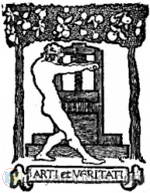 The Sex Worship and Symbolism of Primitive Races An Interpretation
The Sex Worship and Symbolism of Primitive Races An Interpretation
| |
By: Santa Teresa de Jesus (1515-1582) | |
|---|---|
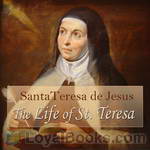 The Life of St. Teresa
The Life of St. Teresa
Saint Teresa of Ávila, also called Saint Teresa of Jesus, baptized as Teresa Sánchez de Cepeda y Ahumada, (March 28, 1515, at Gotarrendura (Ávila), Old Castile, Spain – October 4, 1582, at Alba de Tormes, Salamanca, Spain) was a prominent Spanish mystic, Carmelite nun, and writer of the Counter Reformation. She was a reformer of the Carmelite Order and is considered to be, along with John of the Cross, a founder of the Discalced Carmelites. In 1970 she was named a Doctor of the Church by Pope Paul VI. | |
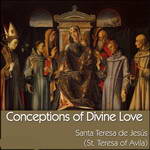 Conceptions of Divine Love
Conceptions of Divine Love
Conceptions of Divine Love was written in 1577. St. Teresa wrote this with the idea of explaining certain words found in the Book of Canticles. When her confessor read the title of her work, he ordered her to immediately burn it, which, of course, she did. But one of her nuns had copied the first seven chapters, which was then published in 1612. Here, Father John Dalton has translated only four of those chapters in 1852. | |
By: Santa Teresa de Jesus (Avila) (1515-1582) | |
|---|---|
 The Way of Perfection
The Way of Perfection
El Camino de Perfección (trans.: The Way of Perfection) is a method for making progress in the contemplative life written by St. Teresa of Ávila for the sisters of her reformed convent of the Carmelite Order (Discalced). St. Teresa was a major figure of the Catholic Reformation in 16th Century Spain. | |
By: Sarah Doudney (1841-1926) | |
|---|---|
 Nelly Channell
Nelly Channell
Another fascinating book by the author of A Vanished Hand. Rhoda returns home after the death of her employer to find out that her cousin Helen, with whom she was raised, also returned home. Her husband stole 300 pounds and had to run away to Australia and leave her pregnant. Rhoda has to reconcile her shame and learn to cope with the new situation. But nothing is as it seems. More than anything, this book is about breaking stigmas and opening up your mind to understand and love people, despite their faults, usually with the help of God. Perfect for fans of good novels about crimes, stories about childhood, along with lovers of religious fiction. - Summary by Stav Nisser. | |
By: Sarah A. (Sarah Ann) Myers (1800-1876) | |
|---|---|
 Watch—Work—Wait Or, The Orphan's Victory
Watch—Work—Wait Or, The Orphan's Victory
| |
By: Sarah J. Rhea | |
|---|---|
 Life of Henry Martyn, Missionary to India and Persia, 1781 to 1812
Life of Henry Martyn, Missionary to India and Persia, 1781 to 1812
| |
By: Sarojini Naidu (1879-1949) | |
|---|---|
 Golden Threshold
Golden Threshold
Sarojini Naidu was a remarkable woman. Known as the Nightingale of India, she started writing at the age of thirteen and throughout her life composed several volumes of poetry, writing many poems which are still famous to this day. As well as being a poet, Naidu was an activist and politician, campaigning for Indian independence and became the first Indian woman to attain the post of President of the Indian National Congress. This volume contains the beautiful 'Indian Love-Song', as well as many other moving verses... | |
By: Selina Bunbury | |
|---|---|
 Fanny, the Flower-Girl, or, Honesty Rewarded
Fanny, the Flower-Girl, or, Honesty Rewarded
| |
By: Selma Lagerlöf (1858-1940) | |
|---|---|
 Christ Legends
Christ Legends
These are beautiful little stories about Christmas from the Swedish storyteller Selma Lagerlöf. As she explains in the first story, they were told her by her grandmother "I remember that grandmother told story after story from morning till night, and that we children sat beside her, quite still, and listened. It was a glorious life! No other children had such happy times as we did. It isn’t much that I recollect about my grandmother. I remember that she had very beautiful snow-white hair, and stooped when she walked, and that she always sat and knitted a stocking... | |
By: Sheldon Dibble (1809-1845) | |
|---|---|
 Thoughts on Missions
Thoughts on Missions
| |
By: Sherwood Eddy (1871-1963) | |
|---|---|
 With Our Soldiers in France
With Our Soldiers in France
| |
By: Sholem Aleichem (1859-1916) | |
|---|---|
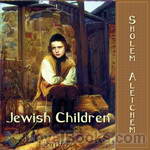 Jewish Children (Yudishe Kinder)
Jewish Children (Yudishe Kinder)
Although written from a child’s perspective, this is not a kids book but a series of funny, poignant, and sometimes disturbing stories about life in a late 19th-century Russian-Jewish village — the world of my grandparents. Sholem Rabinovich (1859-1916) was born in Pereiaslav, Ukraine and later immigrated to New York. His short stories about Tevye and his daughters were freely adapted into the musical FIDDLER ON THE ROOF. Rabinovich’s will contained the following injunction: “Let my name be recalled with laughter or not at all.” His translator, Hannah Berman, was Irish of Lithuanian descent.Some of these stories may be too intense for younger children. | |
By: Sidney Watson | |
|---|---|
 The Mark of the Beast
The Mark of the Beast
| |
By: Silas Hocking (1850-1935) | |
|---|---|
 Her Benny
Her Benny
A very heart touching story about two homeless children, a brother and sister, living on the streets of Liverpool, England during Victorian times. | |
By: Sir Edwin Arnold (Translator) (1832-1904) | |
|---|---|
 Bhagavad Gita
Bhagavad Gita
One of the world’s most valued scriptures, the Bhagavad Gita is a Hindu scripture which is a part of the Indian epic Mahabharata. Undeniably, it is also one of the most important texts in the history of literature and philosophy. The scripture offers a guide on how to achieve a self-sufficient life and clarification of Indian theology. Written in the form of a poetic dialogue between Krishna and Arjuna, the piece is comprised of 700 verses. It depicts the relationship between man and God, a divine purpose, and the omnipresence of God that serves to reward good... | |
By: Sir John Barrow (1764-1848) | |
|---|---|
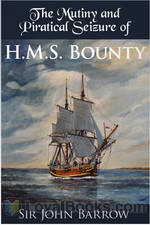 Eventful History of the Mutiny and Piratical Seizure of H.M.S. Bounty
Eventful History of the Mutiny and Piratical Seizure of H.M.S. Bounty
On December 31 1787, the HMS Bounty, a small sailing vessel embarked from Spithead Harbor, England bound for Tahiti. Her mission was sponsored by the Royal Society in London and aimed at picking up breadfruit plants and fruit from Tahiti and conveying them to the West Indies, where it was hoped they would take root and become a commercial crop. The Bounty was an old ship with a young captain and 46 young officers. The captain's cabin was converted into a potting shed for the expected breadfruit cargo... | |
By: Sir Robert Anderson (1841-1918) | |
|---|---|
 Doubter's Doubts About Science and Religion
Doubter's Doubts About Science and Religion
A DOUBTER'S Doubts about Science and Religion was first published anonymously, at a time when the author was Assistant Commissioner of Police and Head of the Criminal Investigation Department, at Scotland Yard . As the book is addressed to men of the world, it speaks from the standpoint of scepticism — the true scepticism which tests everything, not the sham sort which credulously accepts anything that seems to discredit the Bible. If, for example, the Bible taught evolution, it may be averred that evolution would be scoffed by many who now cling to it with a childlike faith worthy of the infant class in the Sunday School... | |
 Fundamentals Volume 2
Fundamentals Volume 2
The Fundamentals: A Testimony To The Truth is a set of ninety essays published between 1910 and 1915 by the Testimony Publishing Company of Chicago. According to its foreword, the publication was designed to be "a new statement of the fundamentals of Christianity." However, its contents reflect a concern with certain theological innovations related to liberal Christianity, especially biblical higher criticism. It is widely considered to be the foundation of modern Christian fundamentalism. The essays were written by sixty-four different authors, representing most of the major Protestant Christian denominations... | |
By: Sister M. Josephine | |
|---|---|
 Ways of St. Anthony
Ways of St. Anthony
Saint Anthony of Padua is especially invoked and venerated all over the world as the patron saint for the recovery of lost items and is credited with many miracles involving lost people, lost things and even lost spiritual goods. The names and places in these stories are fiction; the incidents, however, are real. They were sent to the Editor by clients of the Saint in their accounts of thanksgivings for favors received through St. Anthony's intercession and for which most of them had promised publication. The writer has simply woven these accounts into readable stories. | |
By: Sister Mary Jean Dorcy (1914-1988) | |
|---|---|
 A Crown for Joanna
A Crown for Joanna
She was born a princess, heir to her father’s kingdom of Portugal, and she might at will have reigned from almost any throne in Europe. But instead of this, she made what to her world seemed a thoroughly mad choice – for she chose to have a throne in heaven. Today those scepters are dust which she would not accept, and as Blessed Joanna of Portugal she possesses a throne imperishable… This children’s biography of Blessed Joanna of Portugal was written by Sister Mary Jean Dorcy, a Catholic Dominican Nun... | |
By: Snorri Sturleson (1178-1241) | |
|---|---|
 Prose Edda (Brodeur Translation)
Prose Edda (Brodeur Translation)
Also known as the Younger Edda or Snorri's Edda, the Prose Edda is a three-part work composed or at least compiled by thirteenth-century Icelandic scholar Snorri Sturluson. Along with the Elder or Poetic Edda written by an unknown poet a half-century earlier, the Prose Edda is a major source of much older Norse mythology as it had evolved through the generations. The two Eddas have had a profound effect on European literature in both style and content, not least on J.R.R. Tolkien's Middle-Earth fantasies... | |
By: Society of Friends | |
|---|---|
 On Singing and Music
On Singing and Music
| |
By: Solomon Benjamin Shaw (1854-?) | |
|---|---|
 Children's Edition of Touching Incidents and Remarkable Answers to Prayer
Children's Edition of Touching Incidents and Remarkable Answers to Prayer
Solomon Benjamin Shaw was a Methodist Episcopal minister, historian, essayist and editor. Solomon and Etta Ellen were married in McBride, Montcalm County, Michigan. Solomon resided in Chicago, Illinois for a time before taking up his principal residence in Grand Rapids, Michigan. Rev. Shaw labored on what he referred to as the "undenominational line". This stand constituted a middle ground between the association plan favored by the denomination-oriented members of the National and the independent congregationalists of the movement... | |
By: Sophie May (1833-1906) | |
|---|---|
 Prudy Keeping House
Prudy Keeping House
| |